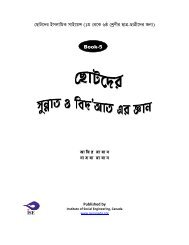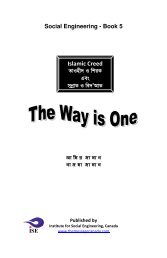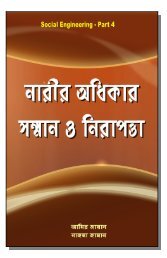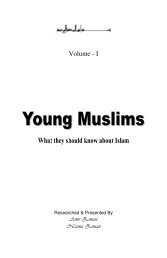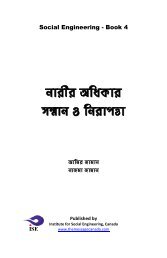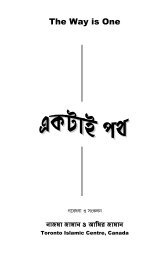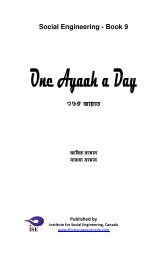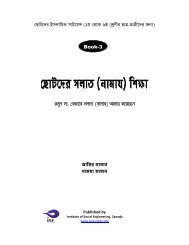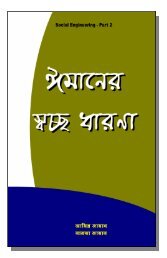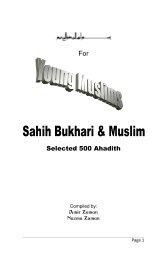Children's Education Series Book - 6 Amir Zaman ... - The Message
Children's Education Series Book - 6 Amir Zaman ... - The Message
Children's Education Series Book - 6 Amir Zaman ... - The Message
You also want an ePaper? Increase the reach of your titles
YUMPU automatically turns print PDFs into web optimized ePapers that Google loves.
Children’s <strong>Education</strong> <strong>Series</strong><strong>Book</strong> - 6From Sahih Bukhari<strong>Amir</strong> <strong>Zaman</strong>Nazma <strong>Zaman</strong>
“Assalamu-Alaikum” Peace be upon you<strong>Amir</strong> <strong>Zaman</strong>Nazma <strong>Zaman</strong>Email: amiraway@hotmail.comwww.themessagecanada.com1 st Edition: July 2012Price: $2ISEPublished byInstitute of Social Engineering, Canadawww.themessagecanada.com3
What is Hadith?In Islamic terminology, the term Hadith refers to reports ofstatements or actions of Prophet Muhammad (bpuh), or of his tacitapproval or criticism of something said or done in his presence.Hadith Qudsi: Hadith Qudsi (Sacred Hadith) is a sub-category ofHadith which are sayings of Muhammad (bpuh). Muslims regard theHadith Qudsi as the words of Allah, repeated by Muhammad andrecorded on the condition of a sanad.Ahadith Narrated by Sahaba (RA)Name of the Sahaba (RA) Number of HadithNarratedAbu Hurayra 5,374Aysha Siddiqa 2,210Abdullah Ibn Abbas 1,660Abdullah Ibn Umar 1,630Jabir Ibn Abdullah 1,540Anas Ibn Malik 1,286Abu Sayeed Khudri 1,170Abdullah Ibn Masud 848Abdullah Ibn Amr Ibn Aas 700Note: Hadith (Singular number)Ahadith (Plural number)Six Prominent Hadith Compilers1. Bukhari 3. Abu Dawood 5. Tirmithi2. Muslim 4. Nasaee 6. Ibne Majah4
1Narrated 'Umar bin Al-Khattab (RA):I heard Allah's Apostle saying, "<strong>The</strong>reward of deeds depends upon theintentions (Niyyah) and every personwill get the reward according to whathe has intended. So whoeveremigrated for worldly benefits or fora woman to marry, his emigration wasfor what he emigrated for." (SahihBukhari)Lesson from this Hadith: Allah will grantrewards according to one’s Niyyah(intention).5
2Narrated Abu Huraira (RA): <strong>The</strong>Prophet said, "Faith (Belief) consistsof more than sixty branches (i.e.parts). And Haya is a part of Faith”(This term "Haya" covers a largenumber of concepts which are to betaken together; amongst them areself-respect, modesty, bashfulness,and scruple, etc.) (Sahih Bukhari)Lesson from this Hadith: Haya (Shame,Modesty, bashfulness) is a part ofImaan. Indecent behavior is deplored.6
3Narrated 'Abdullah bin 'Amr (RA):<strong>The</strong> Prophet said, "A Muslim is theone who avoids harming Muslimswith his tongue and hands. And aMuhajir (emigrant) is the one whogives up (abandons) all what Allahhas forbidden." (Sahih Bukhari)Lesson from this Hadith: A Muslim mustnot harm another Muslim in any manner.And abandoning forbidden (Haram)things and behavior is praiseworthy.7
4Narrated 'Abdullah bin 'Amr (RA):A man asked the Prophet, "Whatsort of deeds or (what qualitiesof) Islam are best?" <strong>The</strong> Prophetreplied, 'To feed (the poor) andgreet those whom you know andthose whom you do not Know.(Sahih Bukhari)Lesson from this Hadith: Feeding thepoor and offering Salam to others arepraiseworthy qualities of a Muslim.8
5Narrated Anas (RA): <strong>The</strong> Prophetsaid, "None of you will have Faithtill he wishes for his (Muslim)brother what he likes for himself."(Sahih Bukhari)Lesson from this Hadith: A Muslim mustalways wish well of another Muslim.9
6Narrated Abu Huraira (RA): "Allah'sApostle said, "By Him in Whose Handsmy life is, none of you will have Faithtill he loves me more than his fatherand his children." (Sahih Bukhari)Lesson from this Hadith: A Muslim must loveProphet Muhammad (bpuh) more thanhis/her own father and children. Love for theProphet is an essential part of Imaan.Proof of loving the Prophet is living life byobeying his instructions in different aspectsof life without any hesitation, objection orresentment whatsoever. Its not mere lipservice,it must be demonstrated by action.10
7Narrated Ibn 'Umar: We used tocompare the people as to who wasbetter during the lifetime of Allah'sApostle. We used to regard Abu Bakras the best, then 'Umar, and then'Uthman. (Sahih Bukhari)Lesson from this Hadith: Best inreputation were Abu Bakr, ‘Umar and'Uthman (RA)11
8Narrated Abu Huraira (RA): Allah'sApostle said, "Whoever establishesthe prayers on the night of Qadr [inRamadan] out of sincere Faith andhoping to attain Allah's rewards (notto show off) then all his past sins willbe forgiven." (Sahih Bukhari)Lesson from this Hadith: Praying in thenight of Lailatul Qadr (in the month ofRamadan) will help a Muslim to gethis/her past sins forgiven by Allah.12
9Narrated Ibn Mas'ud (RA): <strong>The</strong>Prophet used to take care of us inpreaching by selecting a suitable time,so that we might not get bored. (Heabstained from pestering us withsermons and knowledge all the time).(Sahih Bukhari)Lesson from this Hadith: Teaching ofeven good things (like Islam) should bedone at suitable times, not always as itwill then get boring.13
10Narrated Anas (RA): Wheneverthe Prophet asked permission toenter, he knocked on the doorthrice with greeting, and wheneverhe spoke a sentence (said a thing)he used to repeat it thrice. (SahihBukhari)Lesson from this Hadith: Ask permissionto enter anywhere with Salam(Assalamu ‘Alaikum), if necessary byrepeating your request to enter.14
11Narrated Salama (RA): I heardthe Prophet saying, "Whoever(intentionally) ascribes to me whatI have not said then (surely) lethim occupy his seat in Hell-fire."(Sahih Bukhari)Lesson from this Hadith: Describingfalse or unauthentic Hadith claiming it tobe from the Prophet will lead one toHellfire (Jahannam).15
12Narrated Abu Aiyub Al-Ansari (RA):Allah's Apostle said, "If anyone of yougoes to an open space for answeringthe call of nature, he should neitherface nor turn his back towards theQibla; he should either face the eastor the west." (Sahih Bukhari)Lesson from this Hadith: A Muslimshould not face the Qibla or showhis/her back to the Qibla while doinghis/her toilet.16
13Narrated 'Aisha (RA): <strong>The</strong>Prophet used to like to start fromthe right side on wearing shoes,combing his hair and cleaning orwashing himself and on doinganything else. (Sahih Bukhari)Lesson from this Hadith: A Muslimshould start doing things from his/herright side, not the left.17
14Narrated 'Aisha (RA): (the motherof the believers) A child wasbrought to Allah's Apostle and iturinated on the garment (dress) ofthe Prophet. <strong>The</strong> Prophet askedfor water and poured it over thesoiled place. (Sahih Bukhari)Lesson from this Hadith: In case theurine of a small child spoils a part of adress, pouring water on that particularpart only will clean the dress; it is notnecessary to wash the entire dress.18
15Narrated Ibn 'Umar (RA): <strong>The</strong>Prophet had said, "Offer some ofyour prayers (Nawafil) at home,and do not make your houses asgraves." (Sahih Bukhari)Lesson from this Hadith: It isrecommended to pray Nawafil Salat athome, not in the Masjid.(Such a practice causes Allah’sblessings to come down on that houseand also causes the Shaitan to get outof that house.)19
16Narrated Abu Qatada Al-Aslami(RA): Allah's Apostle said, "Ifanyone of you enters a mosque, heshould pray two Raka’t (Salat)before sitting." (Sahih Bukhari)Lesson from this Hadith: <strong>The</strong> Prophetstrongly advised Muslims to pray twoRaka’t Tahiyyatul Masjid Nafl Salat firstafter entering the Masjid.20
17Narrated Abu Musa (RA): <strong>The</strong>Prophet said, "A believer to abeliever is like the bricks of a wall,enforcing each other." While(saying that) the Prophet claspedhis hands, by interlacing hisfingers. (Sahih Bukhari)Lesson from this Hadith: <strong>The</strong> Muslimcommunity should lead a united life tomake the community strong like a brickbuiltbuilding.21
18Narrated Abu Said: <strong>The</strong> Prophetsaid, "Do not abuse my companionsfor if any one of you spent goldequal to Uhud (in Allah’s Cause) itwould not be equal to a Mud oreven a half Mud spent by one ofthem. (Sahih Bukhari)Lesson from this Hadith: We must showrespect to the Companions (Sahaba) ofRasulullah (bpuh).22
19Narrated Ibn Abbas (RA): Oncethe Prophet embraced me(pressed me to his chest) and said,“O Allah, teach him wisdom (i.e.the understanding of theknowledge of Qur'an).”(Sahih Bukhari)Lesson from this Hadith: Importance ofunderstanding the knowledge of theQur’an.23
20Narrated Anas (RA): Bilal wasordered by the Prophet to repeatthe wording of the Adhan forprayers twice, and to pronouncethe wording of the Iqamas onceexcept "Qad-qamat-is-Salat".(Sahih Bukhari)Lesson from this Hadith: How toannounce Adhan (Azaan) and Iqamahfor Salat in Jamat in the Masjid.24
21Narrated Abu Said Al-Khudri(RA): Allah's Apostle said,"Whenever you hear the Adhan,say what the Mu'azzin is saying.(Sahih Bukhari)Lesson from this Hadith: What to say foranswering the Azaan (Adhan) when theMu’azzin announces the Azaan.25
22Narrated Anas bin Malik (RA):Allah's Apostle said, "You shouldlisten to and obey, your ruler evenif he was an Ethiopian (black) slavewhose head looks like a raisin.”(Sahih Bukhari)Lesson from this Hadith: We shouldalways obey the leader as long as he isin Islamic discipline.26
23Narrated 'Aisha (RA): I asked Allah'sApostle about looking hither andthither in prayer (Salat). He replied,"It is a way of stealing by which Satantakes away (a portion) from theprayer of a person." (Sahih Bukhari)Lesson from this Hadith: Inattention duringSalah gives the Satan an opportunity topartially spoil the Salah (Prayers).(Satan is the open/declared enemy of thehumans who leads them to Jahannam)27
24Narrated 'Ubada bin As-Samit(RA): Allah's Apostle said,"Whoever does not recite Al-Fatiha in his prayer (Salah), hisprayer is invalid." (Sahih Bukhari)Lesson from this Hadith: In every raka’hof every Salah, a Musalli must reciteSurah Fatiha, otherwise his/her Salat isinvalid. No Surah Fatiha, no Salat.28
25Narrated Abu Huraira (RA): Allah'sApostle said, "If any one of you says,"Ameen" and the angels in the heavenssay "Ameen" and the former coincideswith the latter, all his past sins will beforgiven." (Sahih Bukhari)Lesson from this Hadith: Saying“Ameen” loudly along with the Imamduring the congregational Salah (Fajr,Maghrib and Isha) helps forgiveness ofpast sins by Allah.29
26Narrated Al-Bara' (RA): <strong>The</strong>bowing, the prostrations, theperiod of standing after bowingand the interval between the twoprostrations of the Prophet usedto be equal in duration. (Sahih Bukhari)Lesson from this Hadith: It indicates theduration of time of bowing (Ruku’),Sajdah (Prostration), Qauma (standingafter Ruku’) and the interval betweentwo Sujud (Prostrations).30
27Narrated Jarir bin 'Abdullah (RA),I gave the pledge of allegiance tothe Prophet for offering prayerperfectly, giving Zakat and givinggood advice to every Muslim.(Sahih Bukhari)Lesson from this Hadith: A Muslimshould offer his/her Salat perfectly, giveZakat, and give good advice to everyMuslim.31
28Narrated Abu Huraira (RA): <strong>The</strong>Prophet (bpuh) said, "<strong>The</strong> bestcharity is that which is practicedby a wealthy person. And startgiving first to your dependents."(Sahih Bukhari)Lesson from this Hadith: Charity beginsat home. That means, a Muslim shouldpay charity (Zakat and Sadaqah) first tohis/her poor close relatives, andthereafter to others.32
29Narrated 'Abda (RA): T heProphet said, "Do not withholdyour money by counting it (i.e.hoarding it), (for if you did so),Allah would also will withhold Hisblessings from you." (Sahih Bukhari)Lesson from this Hadith: If a Muslimdoes not spend on charity (Zakat andSadaqah), rather keeps amassinghis/her wealth, such a person does notreceive any blessing (Rahmat) fromAllah.33
30Narrated Abu Huraira (RA):Allah's Apostle said, "When themonth of Ramadan starts, thegates of the Heaven are openedand the gates of Hell are closedand the devils are chained."(Sahih Bukhari)Lesson from this Hadith: Ramadan is ablessed month during which Muslimsshould fast (Siyam) as commanded byAllah for earning enormous blessingsfrom Him.34
31Narrated 'Aisha (RA): Allah'sApostle said, "Search for theNight of Qadr in the odd nights ofthe last ten days of Ramadan."(Sahih Bukhari)Lesson from this Hadith: A Muslimshould make all sincere efforts to remainawake and pray Nafl Salat in the LailatulQadr in the month of Ramadan.35
32Narrated 'Aisha (RA): (the wife ofthe Prophet) <strong>The</strong> Prophet used topractice Itikaf in the last ten daysof Ramadan till he died and thenhis wives used to practice Itikafafter him. (Sahih Bukhari)Lesson from this Hadith: Itikaf during thelast ten days of Ramadan is acommendable act of worship (Ibadah) ofAllah.36
33Narrated Abu Huraira (RA): <strong>The</strong>family of Muhammad did not eattheir fill for three successive daystill he died. (Sahih Bukhari)Lesson from this Hadith: ProphetMuhammad (bpuh) and his family didnot have enough food to eat every day.Very often they had to starve.We Muslims should practice moderationin eating and never waste any food.37
34Narrated Anas bin Malik (RA): <strong>The</strong>Prophet said, if supper is servedand the Iqama for (Isha) prayer isproclaimed, start with you supperfirst. (Sahih Bukhari)Lesson from this Hadith: If a Muslim ishungry and the Salat time has arrived, itis permissible to eat first and delay theperformance of Salat.38
35Narrated Abu Talha (RA): I heardAllah's Apostle saying; "Angels (ofMercy) do not enter a house whereinthere is a dog or a picture of a livingcreature (a human being or ananimal)." (Sahih Bukhari)Lesson from this Hadith: Presence of adog or a picture of a human being or ananimal in any house is stronglydiscouraged because Allah’s Rahmat(blessings) does not reach that house.39
36Narrated 'Abdullah (RA): It wasmentioned before the Prophet thatthere was a man who slept the nighttill morning (after sunrise). <strong>The</strong>Prophet said, "He is a man in whoseears (or ear) Satan had urinated."(Sahih Bukhari)Lesson from this Hadith: Satanexercises strong influence over aMuslim who does not wake up for FajrSalah in the early morning (Satan is anopen enemy of humans, who leadsthem to Jahannam).40
37Narrated Jarir bin'Abdullah (RA):Allah’s Apostle said: “Allah will notbe merciful to those who are notmerciful to mankind. (Sahih Bukhari)Lesson from this Hadith: We should bemerciful to mankind, merciful to eachother.41
38Narrated 'Ali (RA): I heard theProphet saying, "Mary (Mariam), thedaughter of 'Imran, was the bestamong the women and Khadija is thebest amongst the women."(Sahih Bukhari)Lesson from this Hadith: It describes thesuperior position of Mariam (mother ofProphet Isa) and Khadija (first wife ofthe Prophet) among the women of theworld.We must show due respect to both ofthem.42
39Narrated Abu Mus'ud (RA): <strong>The</strong>Prophet said, "One of the sayings ofthe prophets which the people havegot is, 'If you do not feel ashamed,then do whatever you like." (SahihBukhari)Lesson from this Hadith: Haya (shame,modesty, bashfulness) is a great qualityfor a Muslim, it keeps him/her within theboundary of decency set by Allah.Shamelessness is a big disqualificationand undesirable, because it leads toimmoral activities.43
40Narrated Ibn Umar (RA): <strong>The</strong>Prophet said, "While a man waswalking, dragging his dress withpride, he was caused to beswallowed by the earth and will goon sinking in it till the Day ofResurrection." (Sahih Bukhari)Lesson from this Hadith: Draggingone’s dress on the ground is anevidence of pride and arrogancewhich are despised by Allah. Itinvites displeasure of Allah.44




